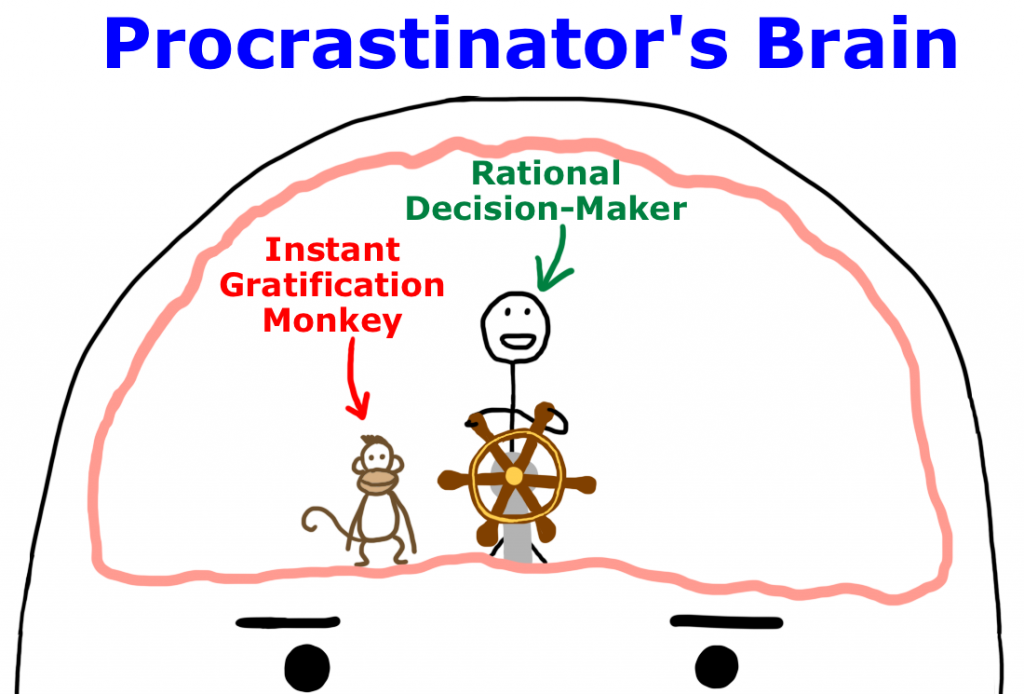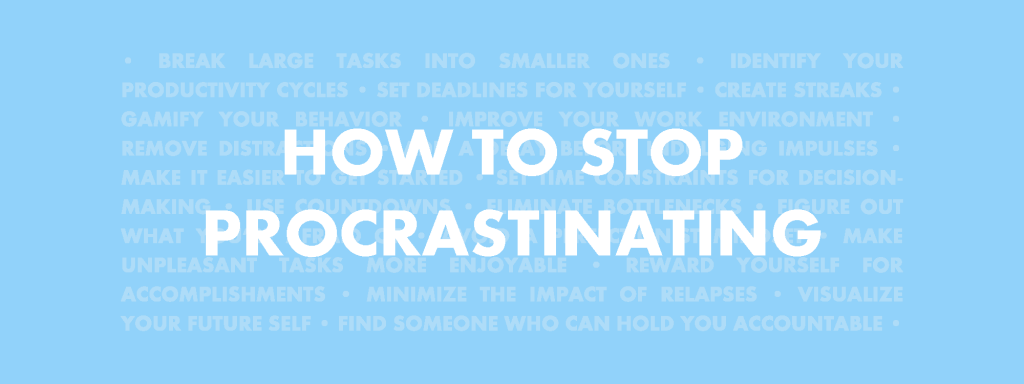Next stop, Procrastination Station!
If you’ve stumbled upon this blog post via the medium of social media, then I would say there’s a good chance you’re engaging in the very same thing that this blog post is about. It’s your best friend and your worst enemy. It is the accumulation of completed Netflix series’ over time, in spite of assignments. It is the “I’ll start on Monday” attitude, followed by the onset of panic when you become conscious of how little time you actually have left to study for exams. It is procrastination.
What is procrastination?
Derived from the Greek word “akrasia”, meaning doing something against your better judgement, procrastination is the act of delaying or putting off tasks. According to Dr. Piers Steel, a procrastination expert and author of “The Procrastination Equation”, approximately 95 percent of us procrastinate to some extent (which hopefully provides a sense of comfort to all you serial procrastinators out there!). It is often misconstrued as laziness. However, this isn’t entirely true because procrastination is in fact completely active. You choose to do something else instead of what you actually should be doing. Laziness on the other hand suggests inactivity.

Why does one procrastinate?

Reasoning behind procrastination varies from person to person. For example, psychologists have identified psychological roots of procrastination including anxiety, depression, low self-confidence and lack of organisation and motivation. Procrastination may also occur out of indecisiveness, in that you may find you cannot decide on a specific course of action, e.g. not being able to decide on a topic for a blog post (most definitely not self-reflecting here…). Perhaps you may also procrastinate because you’re easily distracted? Furthermore, personality links have also been made to chronic procrastination e.g. perfectionism. For people with perfectionism, procrastination may serve as a defence mechanism against fear of failure. The list of reasons goes on and on.

But now, let’s take a trip down brain lane. This explanation that we’re going to delve into is grounded in biology, because like most actions, our neurological mechanisms are somewhat responsible. In many cases, procrastination occurs due to disconnect between our emotional brain and our thinking brain, similar to a process called emotional hijacking. If you’ve been following Motus learning for some time, you may be familiar with this term, as its included in our 7 steps to emotional intelligence program. Basically, our emotional brain (the oldest brain part, comprised of the limbic system and the monkey in the picture) may perceive the thing you’re supposed to be doing as a threat. For example, the task may pose as a threat to our self-esteem and thus, we may leap to avoid it. Because our emotional brain is innately wired to either “fight or flight”, when we “flight” from the task or act on emotion, our brain removes or avoids the threat. This is done through.. yes.. you guessed it… procrastination! So with this in mind, procrastination isn’t necessarily a time-management issues or laziness issue, it’s primarily an emotional and mood issue.
Further, procrastination occurs when your present and future self are disconnected, a sort of temporal disjunction. It’s almost as if your present self and future self are two different people. Your future self is the goal setter, the day dreamer, motivated by long term results. But the present self is the one who has to carry out the action to get there. The down side is that the present self prefers instant gratification over long term results. This falls in line with procrastination being a pleasure seeking principle, a prioritization of short-term relief at the expense of long term progression. Sometimes goals being too abstract can cause this disconnect. For example, saying “I’ll learn to play piano”, instead of making a concise step by step plan, may make the job seem daunting or too big and you may procrastinate instead of starting. Additionally, the danger of such disconnect between your present self and future is that your future self may be left with the burden of avoided tasks, stress and unprocessed underlying emotions.
The good, the bad and the ugly
According to Dr. Ferrari, author of the book “Still procrastinating: The no regret guide to getting it done”, everyone procrastinates, but not everybody is a procrastinator. In most cases it is harmless and part of the human condition. In fact, many argue that procrastination drives creativity. Also, by putting off work until the last minute, some people work better under pressure.
Procrastination becomes an issue when it is chronic, has a negative impact on your wellbeing and is self-defeating. The “short term relief -> stress” relationship leads to a vicious cycle that is chronic. Although procrastination may provide temporary relief, the long term effects may be detrimental. Look at it this way, if you’re avoiding a task because of an emotional reason, the short term relief will soon fade, the initial emotion will still be there, and what’s worse is the task will still be there to be completed, only now with a shorter time-frame. All in all, you’ve just gone and launched yourself into a sea of cortisol and angst. Numerous studies have found that in serious cases, serial procrastination has been associated with increased anxiety, stress, depression and even heart disease. Chronic procrastination can also lead to disrupted sleep patterns and sleep deprivation, the catalyst of countless health conditions. Procrastination may also have career and academic setbacks.
How can you stop procrastinating?

- Identifying why you procrastinate in the first place is key, because then you can directly target the underlying culprit! (note* people are complex. You may be procrastinating for a reason not emphasised in this blog. If so, Google is your friend!)
- Identify and reduce uncomfortable emotions surrounding the task. Writing and journaling may help understand why you’re procrastinating (as it connects the bridge of communication between your emotional brain and thinking brain) and thus, may aid in facilitating behavioural change.
- Replace abstract goals with more concrete goals, which will more likely lead you to take action. Ask yourself…
1. What? – What are the priorities? what do you need to work one? Be specific.
2. How?- How you’re going to do it?
3. Why?- Why you need to do it?
- Empathise with your future self. View your future self as a friend. Remember, when you procrastinate, your present self reaps the short lived rewards while your future self may suffer unnecessary stress and sabotage. This is not ideal.
- Try the 5 minute rule: a cognitive behavioural technique where you tell yourself to do the thing you’re supposed to be doing for no more than 5 minutes. If it’s so terrible, then stop in your tracks. But, you may find that after 5 minutes, it’s actually easier to continue the task.
- Create a reward system and reward yourself every time you’ve made sufficient progress.
- Practice mindfulness. Mindfulness has been shown to improve wellbeing and also enhance your ability to focus on one thing.
- If you’re procrastinating because you’re a perfectionist, try to remove the personal attachment from your task. The task does not determine every ounce of your self-worth!
- Because procrastination often poses as a fertile ground for stress and guilt, remember to be kind to yourself, forgive yourself and show yourself some compassion.
Yours sincerely,
The Motus Movement